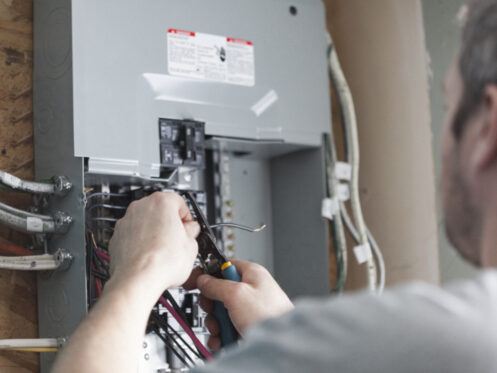Electrical circuits may break or malfunction for several reasons, including power surges following lightning strikes. When a circuit malfunctions or breaks, electricity can stray out of the electrical system and flow elsewhere, including your body or other equipment. Grounding prevents this dangerous phenomenon by providing a path of least resistance for the fault current. A grounding wire safely transfers the stray current to the ground, where it will not hurt anyone or damage any equipment.
Being aware of the implications, professional electricians will always do their best to design, implement, and maintain grounding systems. Ensuring your electrical system is well grounded at construction and even later after years of use will ensure you enjoy several benefits.
1. Eliminates Risk of Electrical Shock
Picture an unfortunate scenario where an accident causes the hot wire to touch the metal body of any of your home appliances. If your system is improperly grounded, the fault current from the appliance’s metal body will pass through you or any of your family members who come into contact with the appliance. The human body will provide an easy path for the fault current to flow to the ground. Properly grounding your electrical system provides this path for the fault current, protecting members of your household from electrical shock or electrocution.
In addition to contact with an electrically charged conductor, an electric shock may happen if you come into contact with a faulty electrical device. By providing an alternative fault current path, proper grounding will prevent the fault current from flowing through your body when there is equipment malfunction or a short circuit through your electrical system. By the same principle, proper grounding protects you from electrical shock and injury due to a lightning strike.
2. Prevents Equipment Damage
Electrical equipment and appliances have a maximum fault current that they can withstand. This is because of the sensitive electronic components that make up part of this equipment. Proper grounding works in tandem with overprotective devices to protect equipment from damage in the event of a fault.
As the grounding system provides an alternative safe for the fault current, the protective devices disconnect the power supply to the equipment or appliances. This two-fold mechanism prevents damage to your equipment. Your equipment is safer, sparing you the cost of repairs or equipment replacement.
3. Reduced Risk of Electrical Fires
A fault current from an appliance plugged into an unplugged system will have no alternative path, forcing it to move back into the appliance, where it will cause overheating. The same will happen for components of your electrical system, such as breakers. The resulting electrical component and appliance overheating, if unchecked, can lead to an electrical fire, which will put your family’s safety at risk and can also destroy your belongings and home.
Similarly, proper grounding acts as an effective surge protector in the event of a massive voltage spike. A downed power line and a lightning strike are good examples of when such a huge voltage spike would occur. In both cases, proper grounding will ensure the excessive voltage passes through your home safely into the ground. In the absence of proper grounding, the excessive voltage will cause an electrical fire that will burn through your wiring and home.
4. Improved Reliability of Electrical System
A grounded electrical system is not only safer but also more reliable. Proper grounding reduces surges that cause damage to electrical system components and appliances. Your system will, therefore, be more stable and efficient, ensuring you don’t have to deal with regular downtime or having to call your electrician to deal with repairs.
Improved system reliability means you can enjoy peace of mind and go about your day without worrying about system failures and downtimes. You will be able to run your electrical devices and appliances as and when you need to, be it running the laundry machine or keeping your laptop powered on if you work from home. Breakers frequently tripping may be a sign of poor grounding.
5. Reducing Electrical Noise
Many electronic devices generate a form of electromagnetic interference or electrical notice while operating. This noise reduces the efficiency of the device and may cause damage to it. Electrical noise may also affect the quality and performance of data and signals, such as your telephone system.
Properly grounding your electrical system helps to reduce this electrical noise. It allows you to enjoy the best signals and data while preserving the efficiency and longevity of the devices that produce electrical noise. On the other hand, if your electrical system is improperly grounded, you will more than likely experience a buzzing sound from your audio system. The electrical noise may also cause strobing lines to appear on your television and computer monitors.
A Glimpse of What Proper Electrical Grounding Looks Like
Grounding is a fundamental part of the design and installation process of electrical construction. Professional electricians will ensure your electrical system is properly grounded to comply with all safety standards and regulations. Proper grounding requires connecting the main service panel through a main conductor to the steel or copper grounding rods driven into the ground. To ensure all parts of your electrical system can safely carry fault currents to the ground, the electrician will ground every switch, outlet, and junction box making up your electrical system.
For a new construction, the electrician will keep grounding in mind when designing your electrical system. From planning out where the grounding electrodes will go to choosing the right materials for your system’s grounding conductors, professional electricians will ensure all electrical circuits in your home are correctly grounded to the grounding system.
Similarly, you can trust a professional electrician to properly ground your system. Age and environmental factors can degrade your grounding system components. Corrosion on the grounding electrodes as well as loose connections can happen over time, reducing the effectiveness of your grounding system. Regular inspection and ongoing maintenance by a professional electrician will ensure your grounding system functions optimally so you can enjoy the highest levels of electrical safety at all times. This will involve a thorough inspection of your electrical system and identifying problem areas on your existing grounding network that require attention.
Properly Ground Your Home With Expert Help
A well-designed electrical system is essential for the performance and safety of electrical circuits and equipment. Proper grounding is a critical element in such a well-designed system and will greatly reduce the risk of electrical hazards such as electrocution, electrical fires, and equipment damage. At John Henry's Plumbing, Heating, Air, and Electrical, our certified electricians strictly adhere to the National Electric Code (NEC) standards and regulations when designing and wiring your electrical system so you can enjoy all the advantages of proper electrical grounding. We will also inspect and perform the necessary maintenance and upgrades on your old grounding system so it works as well as a new one.
Be it for a new construction or home remodel, call us today for professional electrical services. Our family of experts is happy to serve your family’s needs and we offer an extensive range of services such as heating, cooling, drains, and plumbing. We are available 24/7, and our team is proud to be a reliable service for residents of Omaha, Lincoln and surrounding areas since 1996.

